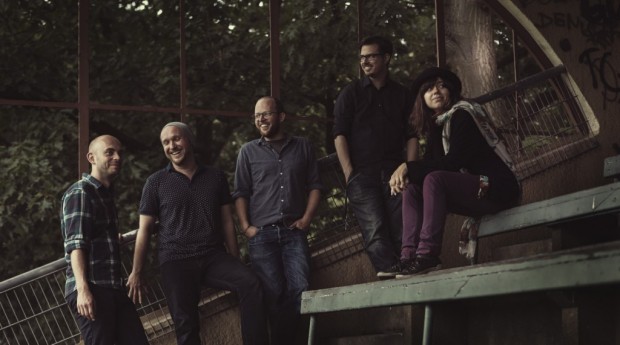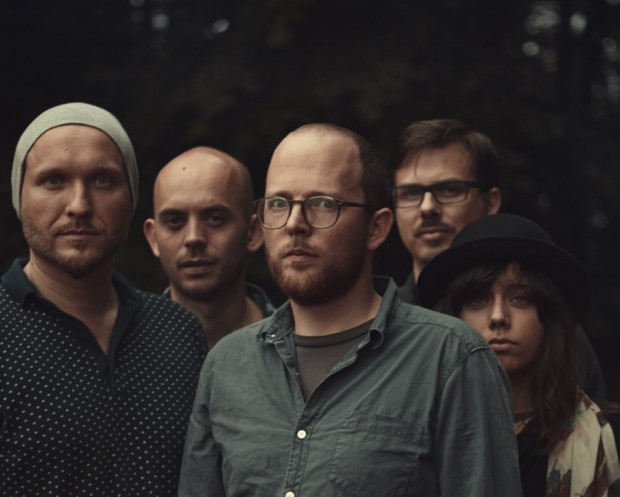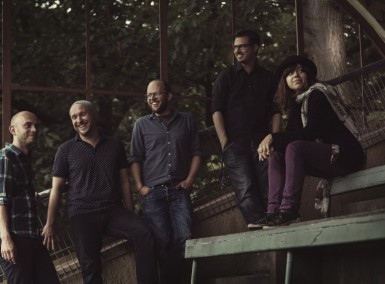
Photo by Tim Ilskens
How time flies. When NOTHING BUT HOPE AND PASSION met German songwriter Stefan Honig two years ago for a chat at the lovely Haldern Pop Festival, he just finished his first show with a band line-up, supporting his album Empty Orchestra. In the two years since that sunny afternoon a lot of things have changed for the musician and his band. Multiple shows all over Europe were played and slowly but steady the ‘idea’ of HONIG really transformed into a full band.
Now, in the wake of the release of the group’s ‘first’ album It’s Not A Hummingbird, It’s Your Father’s Ghost, it’s time for an update on the current state of the band leader, his group and the story behind the epic title of their new longplayer.
So, the last time we talked was two years ago…
Yeah, it was at the Haldern Pop Festival. I remember, because it was in the short gap between the show and me getting very drunk. [laughs]. We played the last day of the festival and I was very nervous, so I was sober for the whole festival, just to be ‘there’ when I’m playing – so when we got off stage, there’s always a guy behind the little tent stage, who hands out vodka shots for the bands that just finish
In those two years, from the outside it looks as though you’ve been touring and recording more or less nonstop. Have you had the opportunity to take some time out?
Yeah, but I don’t like that. The time when I am forced to have time off is when I’m really looking forward to getting back out and doing stuff. I’m not very good at being at home and having no plans. Sometimes I really like it after a tour to have two days where I don’t do anything, but then I start missing having a day job at home. Especially after we finish a record, I don’t feel the urge to create new music – I kinda need a little time off from that, so I’m always happy if there’s a schedule.
Speaking of day jobs, last time we spoke you’d fairly recently left your job as a kindergarten teacher to fully focus on your music. When you look back now, does it feel as though you took the right path?
Yes, definitely. I’m at a point now where I can definitely picture myself going back to that job at some point, and that largely depends on how well the record goes [laughs]. I miss the kids sometimes, but I really don’t miss the whole adult part of working in a kindergarten. There’s a lot of weird stuff going on and you have to deal with a lot of different opinions that are rarely yours. It’s nice to be a musician and to make your own thing.
So, in leaving your job, was it like you were trying this music thing out and seeing what the reception was like?
Yeah. I mean, I was only 33 when I quit my job, and it’s not like I thought ‘this is my last shot’ or anything like that. But it kind of did feel like it in a way, because I had tried to gain success for a long time previously and at that point I had no band really, it was just a solo thing. And I felt as though it was a point where, having a record finished and being on my own, I didn’t have to rely on other people making time for that. I could just tell everybody that I was available and willing to do shows wherever they could send me, and I think that had a lot to do with the success that did actually happen. People started to feel like ‘yes, we can work with this guy, because he’s willing to go the extra mile.’ That got me some of the attention that I needed to get the band motivated to come back and do the whole thing with me. They definitely needed some motivation after all those years where we just played small shows; some bigger opportunities.
Do you think that the time you spent working with children affected your approach to music in any way?
Yeah, definitely. Especially for the first record, I think there was a lot of children’s perspectives in the songs. A lot of the pictures that I used on the first record, like the son with the brand new bike – you have your new bike, and you drive around your neighbourhood and have this view of how it could be if you become an adult, but you don’t really know what it is, and there’s so many different stories going on behind the doors that can represent the choices you can make in life and how you become the person that you want to be or end up being. I think, that on this record, it isn’t that obvious anymore. I had a really nice childhood that I like to remind myself of, so there are positive feelings when I think about being a kid, so that’s still something I go back to sometimes.
You come from a heavy metal background, and you once had a metal band with some of your current band members.
It wasn’t heavy metal as in ‘long hair and all the rest’, more in a progressive sense, like TOOL; a darker thing. Before that we had a Brooklyn hardcore thing that we wanted to dobut that was when we were 16, listening to BIOHAZARD and stuff. [laughs]
Do you ever go back and have a good ol’ metal jam from time to time?
That hasn’t happened in a long, long time. But I kind of went back to that two years ago, when I did an EP with a friend of mine from that time. I was allowed to scream again [laughs]. That was actually really fun, I really liked that.

Photo by Tim Ilskens
The new record’s title, ‘It’s Not A Hummingbird, It’s Your Father’s Ghost’; where did that come from?
It’s a bit of a longer story… When I was twelve I went on this holiday with my parents, my dad organised this trip to go to Canada and over the Rocky Mountains to San Francisco in an RV, and one of the first things I remember from that trip is being in Canada and needing to pee. I went behind a bush and there was this hummingbird right in front of my face. I told my Mum and she was like ‘no, hummingbirds don’t live in Canada, you’ve got to be kidding me.’ She always had this book of plants and animals and it turns out they actually do travel up there in the summer. So, that was a little story that I remembered because I liked being right about it so much. It stayed with me.
Then, my father passed away, right after this holiday. The whole trip became something very special, as it was the last trip that we did together. Then, I went back two years ago for a tour in the US and we stayed at this place in the woods without a tent, and it was a very nice spot. I got up in the morning and I went behind a bush to pee, and the same thing happened with the hummingbird again. It brought back all the memories, and when we were sitting by the campfire that night one of my friends said: ‘That’s not a hummingbird, it was your father’s ghost.’
Now that HONIG is, rather than just you, a full band; has the creative process changed at all? Do you still write all of the songs or are other band members beginning to have some input there as well?
No, I do write the songs. But, for the recent record we took the basic stuff that I did and did the arrangements together. So we came into the rehearsal room and I said I had this idea for a song, and we’d start working on it. There’s one song, for example, where my guitar player did an instrumental thing and I just did the vocals for it. Other than that, it’s mostly my ideas. It’s definitely different this time around. But at the same time, with the last record, I’d finish the basic structure of a song and then go out and say you can try that on there, and things happened that I couldn’t have anticipated in any other way, because it was other people’s input. This time it all happened before we started recording and last time it happened after I recorded the basics.
For example, on the last record there’s no instrumental part, really. I play pretty shitty guitar [laughs] just so that I have something to sing on, so if I do the whole song by myself there’s not likely to be any instrumental parts on it. But that changed because now I have a good band that can actually play, so there’s more room to do something with the other elements that we have.
I’ve noticed that in many of your songs there are these ‘singalong’ moments that sound as though they’re designed for being played live. Would you say that’s the intention?
Yeah, that’s true. The whole background vocal thing; I really like this energy, a lot of people singing and doing this group vocal. I listened to a lot of music that does that during the recordings, and when I sat down to get the ideas for the background stuff I had a lot of that in mind. To have a big group of people just enjoying themselves, and shouting into the microphone. It’s also easily memorable; you hear it once, and you can sing along. In the end I decided against creating more songs of that character because I thought that would sound like I’m ripping myself off. I focussed more on those shouting, prominent background vocals. I think they’re really evident in three songs. We did that in the studio for the first time and then went into the rehearsal room to get the live show going and it was gratifying for me to see that the band could actually reproduce that well. We’re going to have a lot of fun with that live.
When you’re writing and recording an album, are there other musicians that you like to listen to , or do you prefer to go into a ‘studio bubble’, so to speak?
I don’t necessarily think about it like that. Sometimes I don’t have anything that I like to listen to and sometimes I really like to listen to something. I often have this thing that when I like a record a lot I end to just listen to that for some time, and during the recordings for that record. I got into TYPHOON, a band from Portland, an eleven-piece. Really nice songs and a very good band. They did a lot of these energetic vocals, and I think the idea grew in my head, to focus more on that and fill some of my own songs with that.
As you know, we’re all about hope and passion. What are your hopes for the rest of the year?
I really hope that people like the new record. hat’s something I have no control over, but I would love for people to like what they hear and respond to it in a good way [laughs]. I’m very much looking forward to anything that’s going to happen.
So no pressure at all?
No, I don’t feel it actually. I was at a point where I wasn’t sure where the new album was going, where I felt pressure – I had this moment where I was standing on the balcony of the label in Haldern, and they were talking about what to do with the new record, strategies and so forth, and I was thinking ‘I only have two songs, stop talking about the new record!’ But outside, of course, I was acting all excited. I liked what I was hearing, obviously, that they planned to put more energy into it, because with the last record it was actually pretty incredible that they signed me and released it – I’d already sold 1000 copies of it live. It was a very unusual move and very nice of them. In the end I also kind of needed these talks, where I was being pressured but not intentionally to really get going on the album. It did a lot of good, in terms of getting started; and then it started flowing again.
Now it’s out of my hands; the thing is pressed, it’s done, and I can just sit back and watch. And play it [laughs]. That’s a really good thing, because the first record is more or less done with – we played three songs from it last tour just to get a full live set going, but now I can choose from two albums that I really like. It’ll make touring a lot easier, to mix it up. We have a lot more freedom now.
—



